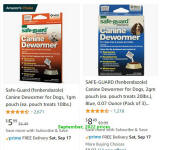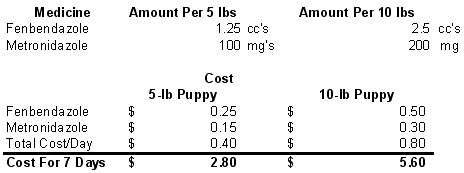







Cedar Ridge Beagles
c/o Toni Perdew
crbeagles@gmail.com
(the best method to reach me is via e-mail)
Bedford, Iowa
Click
here for additional contact information.
Our premises are monitored via video
surveillance for your puppy's safety!
Toni Perdew
3005 Lexington CT
Bedford, IA 50833
|
Liability Disclaimer:
I am not a veterinarian, and do not wish
for you to use this information to diagnose a problem. Instead, it
is offered as "food for thought" for responsible and educated dog
owners.
Pronunciation: (jee ahr' dee uh)
What is it?:
Giardia is a protozoan parasite that lives in
the intestine of affected animals. Infection can occur from contact with the
environment (streams, ponds, mud puddles, or animal stools) or with other
animals carrying the protozoa.
Therefore, any environmental water or any place that other dogs,
cats, squirrels, raccoons, mice, etc. could have walked or left stools is a potential
contamination source!
- It is in the environment, and may well be
nearly unavoidable for dogs that go outdoors to play and potty....which is
almost all dogs!
-
It is estimated that as many as 70% of all dogs/puppies in the US
have the protozoa in their systems, though relatively few ever develop signs.
Not all animals with giardia show signs of carrying
it.
What are the Symptoms?
Many dogs don't ever
get sick or show signs. For dogs that do show symptoms,
signs of giardia include weight loss, inability to gain weight at a proper rate
during growth stages, diarrhea, vomiting, lack of appetite and greasy appearing
stools that are often light in color.
Prevention:
Since we don't believe in keeping
dogs/puppies in stainless steel cages all their lives, we know our dogs could
encounter this germ in our yard, at the beach, on the farm, etc. We try to
prevent puppies from having it when they leave us, and are usually successful
(but not perfect). Following our vet's recommended protocol, we deworm most of our puppies after weaning for 5-7 days with fenbendazole (Safe-Guard's
medicine) or Valbazen. This not only controls common worms, but also treats giardia, if it exists.
Don't hesitate to contact your veterinarian if your puppy has
full blown diarrhea, bloody stools, or is losing weight. Act quickly, as they
are too small to handle diarrhea for long.
Treatment
Giardia is NOT a worm, but a certain common and affordable
worm medicine is used to treat it!
1. Give the fenbendazole for 3
days (more about meds below).
2. On the third day, bathe the puppy and wash his/her bedding (optional, but I
do it).
3. Continue the fenbendazole for 2 or 3 more days, totaling 5+ days...it's so
safe that I've seen some do 14 days.
4. On the last day, bathe the puppy and wash bedding.
The following are often
chosen from as methods of treatment: Metronidazole (Flagyl), Furazolidone (Neftin),
Tinadazole, Fenbendazole (Panacur or Safe-Guard, over the counter), and Albendazole (Valbazen,
over the counter).
The most commonly-used medication for giardia
infection is
fenbendazole (Panacur or
Safe-Guard dewormer) once daily for 5-7 days in a row, and/or
metronidazole (Flagyl)
for 5 days in a row twice per day.
Fenbendazole (Panacur or Safe-Guard are both
Fenbendazole) orally or on food.
Fenbendazole is
usually a liquid when it comes from our vet (though some use the powder), and we would squirt it to the roof of the mouth with a small
syringe (no needle!) or eye dropper. It can also be purchased as Safe-Guard dog dewormer as a powder
(follow instructions for the size range on the box). Fenbendazole is VERY SAFE.

Powdered form:
mix with dog food.
Liquid form: Squirt in the mouth or mix with food. The liquid
form is actually the Panacur/Safe-Guard liquid dewormer bottles
that come in larger quantity that is used for many species. For dogs, the dosage
we have been told to use is 4.5 cc's per 20 lbs.
Metronidazole (Flagyl) is a pill, which we would split, crush, and then mix with
water or tuna juice or orange juice, but is sometimes available as a thick
liquid from a compounding pharmacy. Again, then we would squirt it to the roof
of the mouth with a syringe (no needle on the syringe) or eye dropper. Or, a
small cube of Velveeta cheese can
be used to surround the pill, which can be given as a treat
if the dog/puppy
likes to wolf down Velveeta without chewing.
***NOTE: Some veterinarians do NOT recommend this medicine,
especially for puppies. It does have side effects, so would be
one I would definitely keep to a short duration.
My
veterinarian (and many others) prefers to use ONLY fenbendazole (SafeGuard/Panacur),
and doesn't recommend the Flagyl (metronidazole) unless the dog/puppy is
actually sick and needs more help.
Metronidazole apparently does not taste
good.
Most puppies won't eat food that has metronidazole stirred into it.
But, you can trick them into eating it, or can force feed it.
Options for getting puppies to take pills:
http://www.wikihow.com/Get-Your-Dog-to-Swallow-a-Pill
***Veterinarians vary in opinion, but ours likes to try the
Safe-Guard (Panacur) alone first before adding metronidazole, as metronidazole
does have side effects if given for too long or if too much is given.
Cost of treatment from our vet: We can get fenbendazole (Panacur,
liquid form) for about 12₵ (yes, that is cents) per cc to $1 per cc. For a 10-lb puppy, we'd
give about 2 1/4 cc's per day. A 5-lb puppy would get just over 1 cc per
day for 5 to 7 days, depending upon the vet's instructions.
We get metronidazole (Flagyl) pills for 17
to 30₵
each (2012), 250 mg (one pill would last for 2 days for a 5-lb puppy). Our vet would recommend
5 days of
both medicines at the same time. Here is a cost estimate I worked up in
about 2012. I
increased the actual cost, because we live in a rural area in a part of the US
with a lower-than-average economy. But hopefully, it would be similar to the
cost from your vet.

Not very expensive, thankfully. Wouldn't it be nice if human
medicines were this cheap? :-)
2020 update: Our local vet
charges 50 cents per pill (which is 4 doses for a 5-10 pound puppy) and $1 per cc of fenbendazole, so prices have risen but are still below $10 for the whole
treatment. Below is an example from a veterinarian at/near a larger
population. It's still not bad at about $40, but definitely is higher than
small-town vets.

Click image to enlarge
Also, we have to keep in mind that different veterinarians
mark up their medicines differently. We've seen vets in cities (Pasadena,
Boston) mark up and give dog wormer at 35,625% (you read that right...over 35
THOUSAND percent!) over our own cost. And remember, your vet gets it cheaper
than I do.
But wait...THERE'S MORE!
Flagyl pills (above) are identical to the pills you can buy at
pet supply stores for fish tanks, called FISH ZOLE. We can get generic Flagyl
from our veterinarian for less than 30 cents per pill, but have
heard of vets charging as much as $10 per pill. If our vet was charging
ridiculous prices, we'd sure check out getting FISH ZOLE, which is identical at
this time, instead of lining a vet's pockets! For a 25-lb dog, one 250 mg pill can be
given daily for 5 to 7 days. A 10-lb puppy could get one half of one pill.
(Note: some veterinarians suggest twice per day, some just once per day).
http://www.beaglesunlimited.com/beaglehealth_giardiasis.htm tells more about
FISH ZOLE treatment for giardia.
Since contamination can occur from an activity as simple as
taking your dog for a walk through a park, it is possible that treatment
might have to be given more than once over the lifetime of any dog. There is a
vaccination available, though it's efficacy is in question. Ask your vet if
you feel you live in an area where giardia infection may be a problem (especially
prevalent in Minnesota, Wisconsin, or near
lakes/streams or in moist climates), or if you frequently camp or visit ponds,
lakes, or streams with your dog.
STOP:
Stop here if you are only interested in reading
about Giardia. If you came to this page by
searching for information about dogs with diarrhea, read onward for other
potential causes.
Giardia is not the cause of
diarrhea all the time, though. The following information is
not necessarily about giardia.
Some of the many causes of diarrhea include:
-
Giardia
-
Coccidia
-
Digestive Upset, general (stress induced,
dietary, etc.)
-
Worms
-
Trichomonas
-
Parvo (very serious, potentially lethal)
Non-Medicinal Treatments for Diarrhea:
If your puppy has liquid/water consistency to stools, and not
solid or pudding type stools, it's time to contact a vet. Liquid stools are a
sign of bad diarrhea, and could lead very quickly to dehydration. Dehydration
can lead to death. So, totally liquid stools are not to be taken lightly. See or contact
a vet.
But for "soft" stools, there "usually" is not a danger to the
puppy requiring a vet trip. If you had soft stools, would you go to the doctor?
If a puppy has "soft" stools, with a consistency like pudding, as long as the
puppy is drinking fluids to prevent dehydration, the concern is much, much less.
Remember, I am not a vet and don't recommend anything. These
are just things we've tried or heard of. These ideas might not fix the problem
if the cause is a protozoa, but they can help control diarrhea in general:
- Plain or vanilla yogurt (with cultures). Can mix with a
little cottage cheese.
- Buttermilk (with active cultures).
- Pepto Bismol (2 to 4 times daily for a couple days, 1 cc to
3 cc's each time, depending upon puppy's size...I have heard 1 tsp per 10 lbs
is also a common dosage). Or, crush a Pepto (or generic equivalent) tablet and
mix with canned dog food. Along with this, you can offer Pedialyte to help
prevent dehydration.
- Herbs for diarrhea (we've never used these, but an example
is
here).
- Fasting. For early diarrhea signs, you might
withhold solid food for a day. For small puppies, do NOT withhold water. In
fact, for small puppies, I don't recommend fasting. But for a 6 month old
puppy, it can help to withhold food for a day, and then just offer the bland
food in the next bulleted item.
- Bland diet: rice flavored by boiled chicken for two days
(bland foods). Boil rice with a chicken breast for 20 mins (1 c rice, 2 c
water, 1 chicken breast). Feed only the rice for two days. On day three, offer
some of the chicken breast. If diarrhea goes away, slowly return to
regular dog food.
- Canned pumpkin
- New treatment I will be looking into in order to include it here...at this
time, I have only heard of it, but have not tried it:
Platinum Biosponge

|












